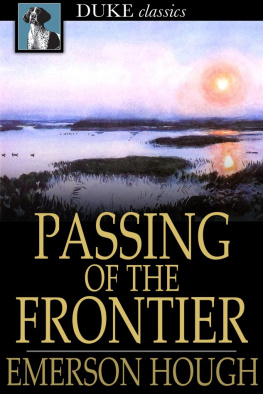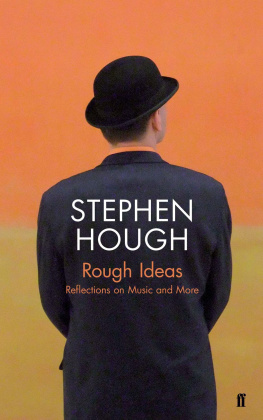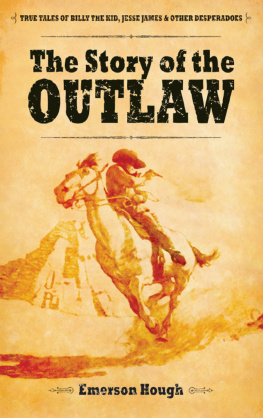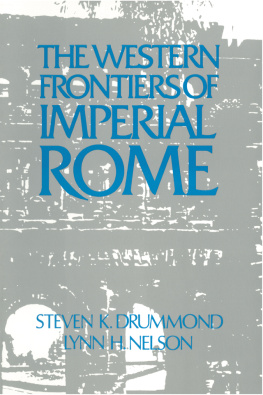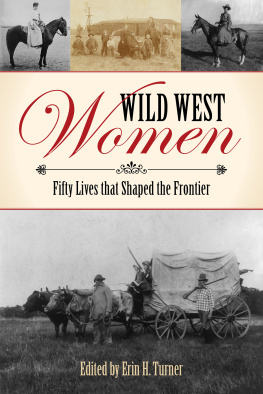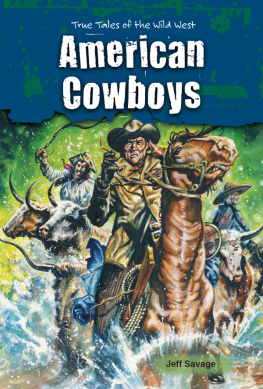PASSING OF THE FRONTIER
A CHRONICLE OF THE OLD WEST
* * *
EMERSON HOUGH
*
Passing of the Frontier
A Chronicle of the Old West
First published in 1918
ISBN 978-1-62011-862-7
Duke Classics
2012 Duke Classics and its licensors. All rights reserved.
While every effort has been used to ensure the accuracy and reliability of the information contained in this edition, Duke Classics does not assume liability or responsibility for any errors or omissions in this book. Duke Classics does not accept responsibility for loss suffered as a result of reliance upon the accuracy or currency of information contained in this book.
Contents
*
Chapter I - The Frontier in History
*
The frontier! There is no word in the English language more stirring,more intimate, or more beloved. It has in it all the elan of the oldFrench phrase, En avant! It carries all of the old Saxon command,Forward!! It means all that America ever meant. It means the old hope ofa real personal liberty, and yet a real human advance in character andachievement. To a genuine American it is the dearest word in all theworld.
What is, or was, the frontier? Where was it? Under what stars did itlie? Because, as the vague Iliads of ancient heroes or the nebulousrecords of the savage gentlemen of the Middle Ages make small specificimpingement on our consciousness today, so also even now begin the talesof our own old frontier to assume a haziness, an unreality, which makesthem seem less history than folklore. Now the truth is that the Americanfrontier of history has many a local habitation and many a name. Andthis is why it lies somewhat indefinite under the blue haze of theyears, all the more alluring for its lack of definition, like some oldmountain range, the softer and more beautiful for its own shadows.
The fascination of the frontier is and has ever been an undying thing.Adventure is the meat of the strong men who have built the world forthose more timid. Adventure and the frontier are one and inseparable.They suggest strength, courage, hardihoodqualities beloved in mensince the world beganqualities which are the very soul of the UnitedStates, itself an experiment, an adventure, a risk accepted. Take awayall our history of political regimes, the story of the rise and fallof this or that partisan aggregation in our government; take away oursomewhat inglorious military past; but leave us forever the traditionof the American frontier! There lies our comfort and our pride. Therewe never have failed. There, indeed, we always realized our ambitions.There, indeed, we were efficient, before that hateful phrase was known.There we were a melting-pot for character, before we came to knowthat odious appellation which classifies us as the melting-pot of thenations.
The frontier was the place and the time of the strong man, of theself-sufficient but restless individual. It was the home of the rebel,the protestant, the unreconciled, the intolerant, the ardentandthe resolute. It was not the conservative and tender man who made ourhistory; it was the man sometimes illiterate, oftentimes uncultured, theman of coarse garb and rude weapons. But the frontiersmen were the truedreamers of the nation. They really were the possessors of a nationalvision. Not statesmen but riflemen and riders made America. The noblestconclusions of American history still rest upon premises which theylaid.
But, in its broadest significance, the frontier knows no country. Itlies also in other lands and in other times than our own. When and whatwas the Great Frontier? We need go back only to the time of Drakeand the sea-dogs, the Elizabethan Age, when all North America was afrontier, almost wholly unknown, compellingly alluring to all boldmen. That was the day of new stirrings in the human heart. Some strangeimpulse seemed to act upon the soul of the braver and bolder Europeans;and they moved westward, nor could have helped that had they tried. Theylived largely and blithely, and died handsomely, those old Elizabethanadventurers, and they lie today in thousands of unrecorded graves upontwo continents, each having found out that any place is good enough fora man to die upon, provided that he be a man.
The American frontier was Elizabethan in its qualitychildlike, simple,and savage. It has not entirely passed; for both Elizabethan folk andElizabethan customs are yet to be found in the United States. Whilethe half-savage civilization of the farther West was roaring on itsway across the continentwhile the day of the keelboatman and theplainsman, of the Indian-fighter and the miner, even the day of thecowboy, was dawning and settingthere still was a frontier left farbehind in the East, near the top of the mountain range which made thefirst great barrier across our pathway to the West. That frontier, thefrontier of Boone and Kenton, of Robertson and Sevier, still exists andmay be seen in the Cumberlandthe only remaining part of America whichis all American. There we may find trace of the Elizabethan Ageidiomslost from English literature and American speech long ago. There we maysee the American home life as it went on more than a hundred yearsago. We may see hanging on the wall the long muzzle-loading rifle of anearlier day. We may see the spinning-wheel and the loom. The women stillmake in part the clothing for their families, and the men still maketheir own household furniture, their own farming implements, their ownboots.
This overhanging frontier of America is a true survival of the days ofDrake as well as of the days of Boone. The people are at once godly andsavage. They breed freely; they love their homes; they are ever readyfor adventure; they are frugal, abstemious, but violent and strong.They carry on still the half-religious blood feuds of the old ScotchHighlands or the North of Ireland, whence they came. They reverencegood women. They care little for material accumulations. They believe inpersonal ease and personal independence. With them life goes on not inthe slow monotony of reiterated performance, but in ragged profile, withlarge exertions followed by large repose. Now that has been the fashionof the frontier in every age and every land of all the world. And so,by studying these people, we may even yet arrive at a just andcomprehensive notion of what we might call the "feel" of the oldfrontier.
There exists, too, yet another Saxon frontier in a far-off portionof the world. In that strange country, Australia, tremendous unknownregions still remain, and the wild pastoral life of such regions bidsfair to exist yet for many years. A cattle king of Queensland heldat one time sixty thousand square miles of land. It is said that theaverage size of pastoral holdings in the northern territory of Australiais two hundred and seventy-five thousand acres. Does this not recall theold times of free range in the American West?
This strange antipodal civilization also retains a curious flavorof Elizabethan ideas. It does not plan for inordinate fortunes, thecontinual amassing of money, but it does deliberately plan for the useby the individual of his individual life. Australian business hours areshorter than American. Routine is less general. The individual takesupon himself a smaller load of effort. He is restive under monotony. Hesets aside a great part of his life for sport. He lives in a large andyoung day of the world. Here we may see a remote picture of our ownAmerican Westbetter, as it seems to me, than that reflected in therapid and wholly commercialized development of Western Canada, which isnot flavored by any age but this.

